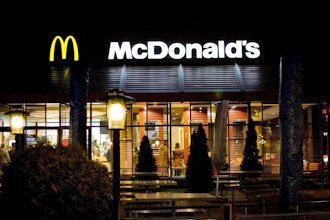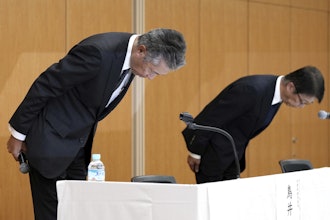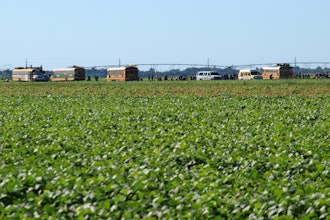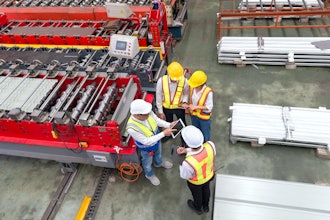
COLUMBIA, S.C. (AP) — Over 100 service industry workers gathered Friday in the capital of South Carolina, the state with the country's lowest unionization rate, to launch a new union and in turn try to boost labor organizing across the South.
The Union of Southern Service Workers hopes to win remedies for what it sees as a common set of grievances across a region historically hostile to unions. Its members cut a broad swath across the service industry, working in places like fast food chains, retail stores, warehouses and nursing homes.
"We are all service workers, no matter what industry you're coming through," said Eshawney Gaston, a Captain D's employee in Durham, North Carolina who helped plan the union's launch in Columbia. "We have to stand up for each other."
Gaston, a 25-year-old mother, said she has faced the same issues at multiple service-industry jobs, including wage theft, poor personal protective equipment and dangerous heat, among others. The problem is greater than any single company and requires a more widespread effort, she said.
Friday's launch comes amid the highest American approval for unions registered by a Gallup poll since 1965 and at the end of a week teeming with labor organizing activity.
Tens of thousands of academic workers across the University of California system walked off the job Monday, demanding better pay and benefits. Starbucks employees seeking better pay and higher staffing went on strike Thursday at more than 100 U.S. stores.
Organizers of USSW seek to supplement, rather than compete with, existing movements like Starbucks Workers United. The group will join the nearly 2 million members of the Service Employees International Union, and its demands include better pay, fair grievance processes, safe workplaces, health care benefits and consistent scheduling.
A broad group of labor organizers attended the launch. Local groups including the South Carolina AFL-CIO gave their support. Mary Kay Henry, president of the Service Employees International Union, was on site. And California activists who fought for the state's nation-leading measure to give fast food workers more power and protections rallied the crowd.
But the political and legal structure in the South has long hindered such organizing. Many states adopted laws in the mid-20th century prohibiting labor contracts that require workers to pay dues or fees to the union representing them. That business-friendly reputation has helped Southern politicians court large employers and add jobs.
The South Carolina Chamber of Commerce, which represents business interests and has opposed a $15 minimum wage, declined to comment when asked for reaction to the union launch.
South Carolina had a 1.7% union membership rate in 2021, compared with 10.3% nationwide, U.S. Bureau of Labor statistics show.
Henry said that environment has also made the South home to the lowest pay and weakest protections in the U.S. This new effort, Henry said, is focused on building power to address laws that constrain Southern workers' bargaining capabilities.
Underscoring the union's work is a decade of organizing by groups like Raise Up the South, the Southern arm of the national Fight for $15 and a Union, which was launched in 2012 by American fast food workers pushing for a higher minimum wage.
"A multiracial, cross-industry movement committed to fighting for living wages, fair working conditions and a voice on the job has emerged from all of the work that's been happening in separated cities," Henry said. "But now workers want to unite across city, across industry."
The region's low union density could make growing the effort more difficult in the South, compared with areas where people have greater familiarity with organized labor, according to Jeff Hirsch, a labor law professor at the University of North Carolina.
Some workers described family members who wrongly believed Southern states had made union organizing illegal. While the region is more "repressive," according to activist Brandon Beachum, a Panera employee in Atlanta, he said, Southern workers have "much more of a fighting spirit."
Other trends could work in the union's favor. Hirsch said that the nationwide labor shortage has given some leverage to workers, and that employers might be less inclined to retaliate by firing union members. While general collective action theory suggests it is harder to organize units the bigger they get, Hirsch said, a large, diverse group across employers would be "quite powerful."
"Widespread organizing in the South has been the holy grail for a while of the union movement," Hirsch said. "I will remain skeptical just because of the history. But if they were able to make inroads that would be a big, big deal."
The revamped focus on the region comes from a desire to confront anti-union attitudes organizers say are steeped in the legacy of Jim Crow. While previous efforts to achieve widespread unionization throughout the South failed, supporters are heartened by past multiracial labor movements.
One was a 1946 effort in North Carolina to unionize tobacco workers that found success with the help of Black churches, said Dorian Warren, co-president of the Center for Community Change, which hopes to build support for the USSW among community organizations and churches.
And organizers pointed to 1969 Charleston strikes in which African American women won pay raises and a more transparent hiring system, though failed to gain union recognition.
"There's actually a deep, indigenous legacy in the South of organizing in a multiracial way to overcome anti-union and anti-Black sentiment in particular," Warren said. "I find this effort exciting because these workers and the organizers know that history, and they're grounded in that history."






















